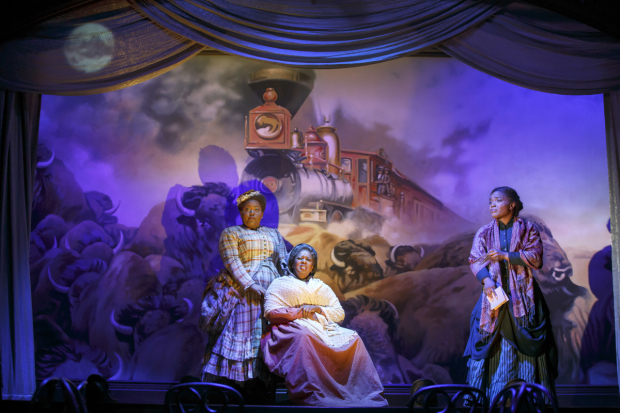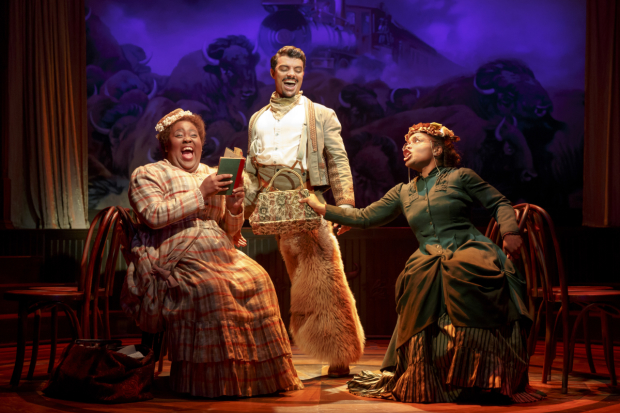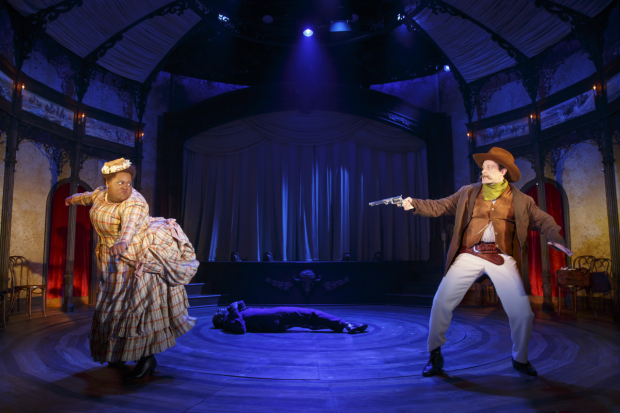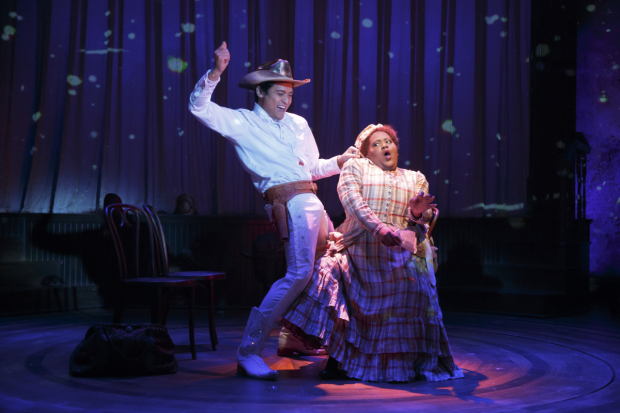Bella: An American Tall Tale
Kirsten Childs pens a new musical about a woman with a legendary behind.

(© Joan Marcus)
If you've never seen a "big booty gal" fight off a lecherous plantation owner with the power of her farts, now is your chance! You can experience that and more in Bella: An American Tall Tale, Kirsten Childs's hot mess of a musical now making its New York debut at Playwrights Horizons.
Set in the wild west of the 1870s, it tells the "110% true" story of Bella (Ashley D. Kelly), a fat-bottomed girl from Tupelo, Mississippi, who takes a train across the frontier to be with her love, buffalo soldier Aloysius T. Honeycutt (Britton Smith). Along the way she meets Miss Cabbagestalk (Kenita R. Miller), a mail-order bride who falls in love with a Norteño cowboy named Diego (Yurel Echezarreta). She also makes friends with kindly Pullman porter Nathaniel Beckworth (Brandon Gill). All the while, Bella is pursued by Bonny Johnny (Kevin Massey), a Southern gentleman whom Bella felled with her flatulence. Diverted on her journey, she eventually joins the circus where her rear becomes an international sensation.

(© Joan Marcus)
Childs (who wrote the book, music, and lyrics) is best known for The Bubbly Black Girl Sheds Her Chameleon Skin, which is set for a concert production this summer from Encores! Off-Center. Similar in tone, Bella oscillates wildly between aggressive zaniness and social justice evangelism: Bonny Johnny sings a jaunty Celtic ditty about rape culture. Bella makes a comment about there being no such thing as a Chinese cowboy right before one shows up (that would be Paolo Montalban, performing a caffeinated country-western strip routine). When she complains to Nathaniel that he's being unfair to her, he retorts, "You want to talk to somebody ‘bout what’s fair? Talk to them Indians them soldier boys is roundin’ up out there." The two later put aside their differences to raft down a raging river on her rump, which apparently doubles as a floatation device. Obviously, Childs likes big butts and she cannot lie…or can she?
In its most coherent moments, Bella looks and sounds like a dubiously dramaturged educational musical for kids. This is disappointing because Childs sets her story in a time of rich dramatic potential: The late 1870s saw the end of Reconstruction (as part of the compromise resolving the disputed election of 1876) and the beginning of the Jim Crow era. Childs, who laments in her program note that black Americans of this era were absent from her childhood history books, seems to acknowledge that this is a period that needs fewer tall tales and more truth. Unfortunately, she misses a golden opportunity to teach her audience about that suppressed history, opting instead for a mostly concocted one that gives priority to silly accents and butt jokes.

(© Joan Marcus)
At least the cast works hard to sell this muddled material: It is difficult not to crack a smile during "White People Tonight," an African exotica number about cannibalism that turns into the most delightful production number in the show (irrepressibly joyful choreography by Camille A. Brown). As Diego, Echezarreta leaps like Rudolph Nureyev and lands his high notes like Juan Diego Florez. Miller brings down the house with the surprisingly sensitive ballad, "Mama, Where Did You Go?" NaTasha Yvette Williams delivers two great performances as both Bella's forgetful grandma and the Spirit of the Booty, the literal soul of Bella's behind, who sings the rousing revenge number, "One Ass to Another."
Kelley cracks us up with her seemingly involuntary dance moves during this song. She is an undeniably appealing leading lady with a presence exponentially larger than the prosthetic posterior she wears throughout the show. We're glad to have her as a constant in this ever-changing story, which introduces new characters and plotlines well into the second act.
Director Robert O'Hara (who is the author of Bootycandy) does little through staging and design to clarify Childs's winding script. His blocking is surprisingly listless considering Clint Ramos's set features a Hamilton-style turntable within another turntable. Unfortunately, much of the playing space is taken up by a proscenium stage within the proscenium stage, which becomes a rarely used waste of space.
Ramos also didn't coordinate well with Jeff Sugg, whose cartoonish projections are very difficult to see on the back curtains of the set. A whole segment in which the actors comment on the projections as they float down a river is sunk by this poor execution. Japhy Weideman's atrociously spotty lighting doesn't help matters. At least Dede M. Ayite's costumes are often very well executed: A sparkling thread weaves through Bella's gingham dress, letting us know that she is meant to be a star. Diego's chaps are ridiculously furry, while the Chinese cowboy's tiny gold speedo will send many jaws hurtling to the floor.

(© Joan Marcus)
The show's love-hate relationship with stereotype and exploitation makes response particularly perilous: Childs's tendency to shift on a dime from sincerity to flippancy has the effect of making us throw up our hands in surrender, unable to discern what the creators of this musical want from us. Rather than feeling inspired, challenged, or even amused, audiences are most likely to leave Bella feeling baffled.









